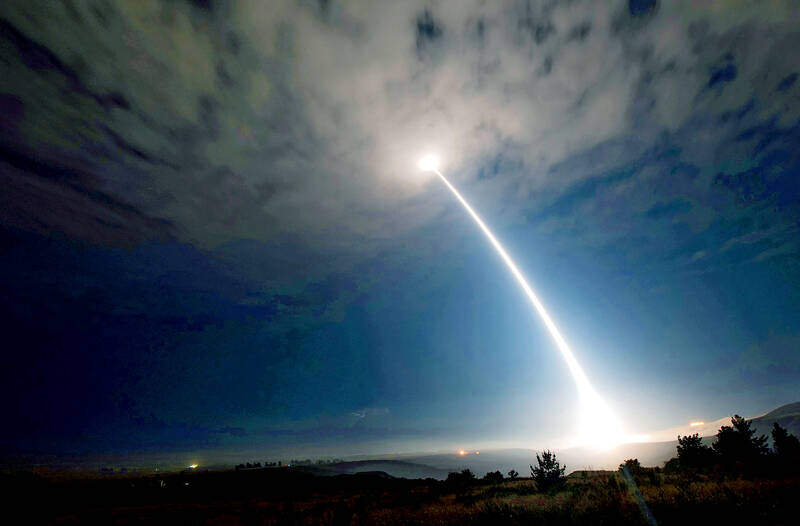A proposal to put Taiwan under the US nuclear umbrella has drawn mostly positive responses from defense experts, after Minister of Foreign Affairs Joseph Wu (吳釗燮) told lawmakers at the Legislative Yuan on Monday that Taipei and Washington are engaged in talks on the matter.
Taiwan’s national security doctrine explicitly rejects the development of nuclear, chemical and biological weapons of mass destruction, despite the nation facing the threat of such weapons being used against it, Institute for National Defense and Security research fellow Su Tzu-yun (蘇紫雲) said yesterday.
The extension of an ally’s nuclear umbrella over Taiwan would be significantly beneficial to the Taiwan’s security, he said.

Photo: Reuters
The nuclear umbrella is a deterrence strategy developed during the Cold War. The US uses it to guarantee the safety of smaller countries by threatening to retaliate in kind if those allies came under nuclear attack, he said.
Taiwan’s armed forces already provide conventional deterrence, but obtaining a nuclear deterrence would reduce its susceptibility to nuclear coercion, Su said.
Taiwan’s bid to be protected by the US nuclear umbrella would depend on domestic and international factors, including the outcome of the presidential election next year, Lu Hsin-chi (盧信吉), an assistant professor of international politics at National Chung Hsing University, told an Institute for National Policy Research forum on Monday.
The political will of Taiwanese would play a large part in the international community’s perception and assessment of the cross-strait situation, while the forcefulness of China’s reaction would also likely affect the outcome, he said.
If international and domestic conditions align, it would be possible for the US to provide Taiwan with a certain level of nuclear deterrence, including deploying ballistic missile submarines to patrol the nation’s waters, he said.
The threat of a nuclear-armed North Korea has reinvigorated the South Korea-US military alliance, with South Korean President Yoon Suk-yeol’s administration and US officials issuing the Washington Declaration last month, he said.
Expansion of the US nuclear umbrella over South Korea and Japan would potentially pave the way for Taiwan, he said.

An essay competition jointly organized by a local writing society and a publisher affiliated with the Chinese Communist Party (CCP) might have contravened the Act Governing Relations Between the People of the Taiwan Area and the Mainland Area (臺灣地區與大陸地區人民關係條例), the Mainland Affairs Council (MAC) said on Thursday. “In this case, the partner organization is clearly an agency under the CCP’s Fujian Provincial Committee,” MAC Deputy Minister and spokesperson Liang Wen-chieh (梁文傑) said at a news briefing in Taipei. “It also involves bringing Taiwanese students to China with all-expenses-paid arrangements to attend award ceremonies and camps,” Liang said. Those two “characteristics” are typically sufficient

A magnitude 5.9 earthquake that struck about 33km off the coast of Hualien City was the "main shock" in a series of quakes in the area, with aftershocks expected over the next three days, the Central Weather Administration (CWA) said yesterday. Prior to the magnitude 5.9 quake shaking most of Taiwan at 6:53pm yesterday, six other earthquakes stronger than a magnitude of 4, starting with a magnitude 5.5 quake at 6:09pm, occurred in the area. CWA Seismological Center Director Wu Chien-fu (吳健富) confirmed that the quakes were all part of the same series and that the magnitude 5.5 temblor was

The brilliant blue waters, thick foliage and bucolic atmosphere on this seemingly idyllic archipelago deep in the Pacific Ocean belie the key role it now plays in a titanic geopolitical struggle. Palau is again on the front line as China, and the US and its allies prepare their forces in an intensifying contest for control over the Asia-Pacific region. The democratic nation of just 17,000 people hosts US-controlled airstrips and soon-to-be-completed radar installations that the US military describes as “critical” to monitoring vast swathes of water and airspace. It is also a key piece of the second island chain, a string of

The Central Weather Administration has issued a heat alert for southeastern Taiwan, warning of temperatures as high as 36°C today, while alerting some coastal areas of strong winds later in the day. Kaohsiung’s Neimen District (內門) and Pingtung County’s Neipu Township (內埔) are under an orange heat alert, which warns of temperatures as high as 36°C for three consecutive days, the CWA said, citing southwest winds. The heat would also extend to Tainan’s Nansi (楠西) and Yujing (玉井) districts, as well as Pingtung’s Gaoshu (高樹), Yanpu (鹽埔) and Majia (瑪家) townships, it said, forecasting highs of up to 36°C in those areas